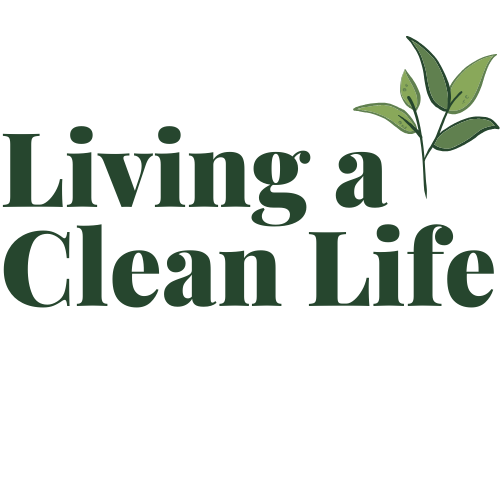Disclosure: We are reader-supported. If you buy through links on our site, we may earn a small commission. Learn more.
Caffeine: Is it bad for you? Let me start by saying, I know this will be an unpopular post. People don't want to hear that the coffee they love waking up to, is not good for them, but hear me out. You may decide to stop drinking coffee completely, drink a little less coffee, or at a minimum start drinking clean coffee.
I never even tried coffee until I was in my 20’s, when one of my roommates talked me into trying it. I remember loving this hazelnut flavored coffee with a scoop of sugar and a splash of milk, it was SO good. I only drank one cup a day on my way to work, but I would practically dream about waking up and getting to drink my cup of coffee. It's the best part of waking up, right?
After a while I realized that I needed to cut out the scoop of sugar, so I started drinking it black or with a little milk. It wasn’t quite as good, but I still always looked forward to drinking it. Caffeine is addictive after all.
When I got married, and we knew we wanted to get pregnant, I stopped drinking coffee. I gave it up for my entire pregnancy and while nursing. Having had three back to back pregnancies followed by nursing, I went a LONG time without drinking coffee.
Is caffeine bad for you?
When I read Anthony William’s new book “Cleanse to Heal”, and learned how hard caffeine is on your liver and adrenals, I realized it was time to give coffee up for good.
Honestly, the first few days were HARD, and I felt a little like a zombie, but the hardest part is always just breaking the habit. I love my new morning routine of waking up and drinking celery juice and a smoothie. They give me the energy I need, without making me jittery. I personally enjoy not being dependent on a stimulant to get through my day.
Two issues
- Dehydrates the body
- Prompts the adrenal glands to pump unnecessary levels of adrenaline into your bloodstream, which causes a variety of compromises to your brain, liver, and kidneys.
Fight or flight
Fight or flight is the release of complex blends of life-saving hormones from the adrenals. Caffeine gives our adrenals a sense of fight or flight without our actual life circumstances being fight or flight (boy who cried wolf syndrome). Fight or flight should be used when we are dealing with stress, loss, or when giving birth. When you are giving birth, your adrenals are spilling adrenaline. We need to save it for those special moments.
Trashing your adrenal glands
Our adrenal glands produce important hormones, adrenaline and cortisol, which are essential for an effective response to stress. If you are drinking caffeine all day long (especially if you are skipping meals), you are slowly trashing your adrenal glands, and continually telling your body that there is a crisis, prompting your adrenals to respond all day long. When a real crisis comes, we may not respond appropriately because we become immune to the adrenaline hitting the central nervous system.
Adrenaline is acidic
The adrenaline that flight or fight triggers can be highly toxic to the body because it is highly acidic and corrosive to the nervous system and organs. This adrenaline release is not meant to be used every day let alone multiple times a day.
Stop caffeine between pregnancies
I recently watched a Facebook live by Medical Medium, Anthony William. He recommends women stop caffeine between pregnancies, otherwise you are going to burn your adrenals out when you have another. He also says hair loss after birth has to do with your adrenals getting tired. When you burn out the adrenals, the hormone blend that you need to keep hair follicles alive, become missing because of all the caffeine.
Caffeine bad for you? Long term effects
Caffeine use over the years can lead to blood sugar imbalances, headaches, insomnia, chronic fatigue, kidney stones, premature aging of the skin, adrenal fatigue, and in some cases hair-loss in women.
Coffee Alternative
I recently came across a company called Rasa, which is an apoptogenic herbal alternative to coffee.
Is it organic?
Rasa is 100% organic, gluten free, whole 30, 3rd party tested, sugar free, and vegan!
Does it have caffeine?
The Original Rasa is naturally caffeine free, the Cacao Rasa has < 5mg of caffeine (so according to the FDA it is considered caffeine free). Dirty Rasa has actual coffee so it has 35 mg of caffeine (1/5 a standard cup of coffee).
What are adaptogens?
Adaptogens are nature's antidote to the stressors of modern life These herbs live in harsh conditions around the world, meaning they not only learned how to be resilient in the face of stress, but actually thrive in stressful environments.
- They must be safe in normal therapeutic doses
- It must help your body holistically resist a wide variety of stressors
- It must have a normalizing effect on overall body function, helping your body maintain homeostasis
These are some of the adaptogens and other herbs used in Rasa and their benefits
- Chicory root: Enhances digestion and regulates the bowels and liver, boosts flavor, and is rich in inulin making it a fantastic prebiotic
- Burdock root: Purifies by stimulating the lymphatic system and also boosts the immune system.
- Dandelion root: Gently detoxifies, promotes digestion and improves liver function.
- Eleuthero: Cultivates pure energy, balances the endocrine system and tonifies Qi.
- Shatavari: Nourishes the entire body, restores the nervous system and enhances fertility.
- He shou wu: Rejuvenates, improves, sexual vibrancy and enhances memory and our stress response system.
- Codonopsis: Restores the body's natural energy, strengthens the immune sytem and promotes digestion.
- Chaga: Provides broad-spectrum immune support and purifies the bloodstream.
- Ashwagandha- Provides a calm balance, promotes longevity, soothes nerves and builds up energy stores.
- Rhodiola: Supports endurance and stamina, improves your mood and brain power and enhances fertility.
- Ceylon cinnamon: Stimulates circulation, supports blood sugar balance and relieves sore muscles.
- Reishi: Relaxes the mind and strengthens the adrenal system

Clean coffee
I know giving up coffee/caffeine is non-negotiable for most people. People LOVE their coffee. THEY LOVE THEIR COFFEE, and they will find any study they can to say that coffee is good for you. However, most studies that will back the health benefits of high-quality chocolate, matcha tea, coffee, etc, are paid-for-studies. Speaking of high quality chocolate, the best chocolate i have come across is HU chocolate. I love their chocolate bars and chocolate covered nuts.

If you are going to continue to drink coffee, try to find one that is non-toxic. As far as clean coffee goes, the only one I have tried is Bulletproof coffee. I am sure there are other brands of coffee that are non-toxic, but this is the only one I have personally tried.

Mycotoxins and mold
Mold toxins (also called mycotoxins) occur naturally in many foods and can be found growing in many environments. Bulletproof coffee is free of mycotoxins and mold. The founder of Bulletproof coffee, Dave Asprey, wrote a book that I read several years ago called “Headstrong”. In his book, he talks about how mold toxins are a problem when it comes to coffee.
United Sates has no standards for coffee
A little bit from the book "Headstrong". “A 2003 study showed more than 90% of coffee beans were contaminated with mold before processing, while an earlier study revealed that almost 50% of brewed coffees are moldy. These studies were so alarming that many countries rushed to set strict limits for the allowable amount of OTA (Ochratoxin A) which is a type of mold in coffee. But the United States has no standards for coffee so it lags behind the EU, South Korea, Singapore, and China, all of which have set limits at economically feasible levels. And the coffee they reject, actually gets sent to the US for unsuspecting people to drink.”
Decaf coffee
In the book he also claims, that on average, decaf coffee contains more mold toxins than caffeinated. This is partly because producers use lower-quality beans to make decaf and partly because caffeine acts as a natural anti-fungal defense mechanism.
What to look for when choosing a coffee
The type of coffee bean you buy is important. Bulletproof coffee beans are made without fermentation and are tested for 27 different toxins before being deemed safe. Here are the four things to look for when choosing a coffee.
- Single-estate coffee (comes from one place- not multiple).
- Washed coffee (not natural process coffee)
- Look for Central American coffee
- High elevation (reduces mold problem by making stronger plants).
Organic
In this case, organic means nothing. Organic coffee can sit in dirty water and grow mold toxins just like conventional coffee.
Butter in your coffee?
The founder of Bulletproof coffee however advocates eating a high fat, keto diet. He even recommends putting Ghee and Brain Octane Oil in your coffee. This basically goes against everything the Medical Medium says about eating a low-fat diet. If you do get Bulletproof coffee, I would drink it black and try to limit your caffeine intake. Since I know a lot of people swear by their keto diet, I will address the issues with this diet in my next blog.
Restoring your adrenals
Grazing is critical to healing. Here are ten great snack combinations that help restore the adrenals. If your blood sugar drops and your liver’s glucose reserves are low to nonexistent, your adrenals are going to be forced to produce excess adrenaline to compensate. Eating one of these snacks every 1.5-2 hours that contain the right balance of glucose, sodium, and potassium your body needs you can prevent the blood sugar dips that force your adrenals to fill in and release adrenaline.
- Apple, celery, dates
- Orange, avocado, spinach
- Dates, bananas, and romaine lettuce
- Coconut water, banana, spinach
- Pear, Mache, and berries
- Berries, honey, and celery juice
- Apples, dates, and kale
- Grapes, banana, and red leaf lettuce
- Cauliflower, apple, and cucumber
- Watermelon with lime juice

